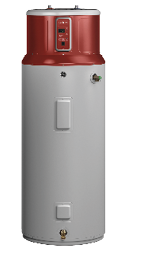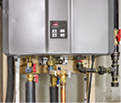‘Water you’ wasting energy and energy dollars on? Your hot water heater may be overheating your energy bill. You’ll say ‘tanks’ for these hot tips.
by
BRYCE CAVAZOS
Tucked away, out of sight and out of mind, water heaters can slurp down energy while hardly making a sound.
According to the U.S. Department of Energy, electric water heaters account for approximately 18 percent of residential energy consumption. This makes electric water heaters the second largest energy-consuming electric appliance in a home, only surpassed by HVAC equipment.
On average, a typical household consumes 64 gallons of hot water daily, which equates to about $600 a year in water heating alone. The Department of Energy states that about 27 million households in the U.S. have a water heater that’s more than 10 years old. Older water heaters run for longer periods of time because of the deteriorating insulation and sediment buildup at the bottom, which makes it harder for heating elements to heat the water. Consumers typically see water heater failures/leaks after 10-15 years, forcing the need for replacement. It is important for members to be educated on which replacement option is best for them, especially if their water heater falls into this category.
“We have received numerous questions from our members recently about hot water heaters,” said Eric Compton, United energy solutions specialist. “With new technology on the market, there are multiple options to realize energy savings.”
United is here to break down the several types of water heaters available, as well as provide energy efficiency tips to existing systems.
Standard Electric Water Heaters
Standard electric storage tank water heaters are the most common type of water heaters within United’s territory. They’re relatively inexpensive and easy to install, and if maintained properly, an electric tank water heater has a life expectancy of approximately 10-15 years.
A standard electric tank consumes 4,500 to 5,500 watts while operating. On average, a water heater operates at least three hours a day, which equates to 13-17 kWh or about $2.10 every day. Location of the tank can serve as an important factor in its energy consumption. If the tank is located within an unconditioned space, such as a garage or attic space, this will lead to increased consumption, especially in cold weather.
Members can mitigate this problem by adding additional insulation, such as a water heater blanket, to minimize heat loss to the surrounding air. Although actual energy usage will vary for each home, it is important to understand the significant usage that a tank water heater consumes. If installation costs are a concern for the homeowner, and electricity is the sole energy source in a home, a standard electric tank water heater may be the best choice. Consumers should refer to the energy guide sticker for an estimate of electric usage when the time comes to shop for a new electric tank water heater.
Heat Pump

When it comes to electric water heaters, the efficiency of heat pump water heaters is unmatched. Heat pump water heaters are still considered tank-style water heaters. However, they use surrounding air to heat the water. The transferring of heat is significantly less energy-intensive than converting heat from an energy source. Due to this heat transfer, heat pump water heaters perform best in unconditioned spaces and are not recommended for interior spaces. Texas weather is generally optimal for the performance of these water heaters. For peace of mind, this unit will still have electric elements to serve as a backup during extreme cold or to compensate with higher water demand at times.
According to the Department of Energy, heat pump water heaters are two to three times more energy efficient when compared to standard tank water heaters, which can lead to hundreds of dollars in annual energy savings. United currently offers a $150 rebate on newly installed heat pump water heaters. In order to qualify, the unit must have a capacity of at least 40-gallons and a Uniform Energy Factor (UEF) of 2.0 or higher.
Natural Gas or Liquid Propane
Homes with access to natural gas or liquid propane (LP) can choose from either a gas or electric water heater. Although natural gas and LP water heaters do not rely on electricity as their primary energy source, they still can present a substantial expense in annual fuel charges. The main difference between gas tank water heaters and standard electric tank water heaters is the heat source. Gas and propane water heaters use burners whereas electric water heaters use heating elements to heat water and keep water at its set temperature.
Tankless Water Heaters
Tankless Natural Gas or Liquid
Propane

For a home with access to natural gas or LP, a tankless (or “on demand”) water heater may be a beneficial upgrade, especially for those with increased hot water demand. Tankless water heaters can reduce fuel consumption since they do not store any water and only heat water when being consumed. The absence of a storage tank significantly minimizes the standby energy losses of these water heaters. Additional benefits of tankless systems include the access to instant hot water at the faucet, as well as equipment space savings compared to tank counterparts. Although tankless water heaters are regarded as longer-lasting systems with a life expectancy of about 20 years, they do require regular maintenance. This is especially true if the home has hard water, which can lead to increased clogging within the tankless water heater. It is important to consider all factors when considering retrofitting to a tankless water heating system, including appropriate ventilation and a gas line upgrade if necessary.
Tankless Electric
If access to natural gas or LP is out of reach, electric tankless water heaters are an option. Electric tankless water heaters are slightly smaller than tankless gas water heaters, and there is no ventilation requirement. A significant downside to going electric, however, is the large increase in the electric demand when compared to tank systems. Tankless electric water heaters can use up to 28,000 watts of electrical demand, equivalent to six to seven times the demand of an electric tank. This often leads to increased electrical-related installation costs and significantly higher energy consumption. Overall, installing a tankless electric water heater is generally not recommended as the cons severely outweigh the benefits.
Efficiency Tips

When it comes to saving energy dollars, United encourages its members to consider new energy efficient items that are available on the market. If water heater replacement is not in the budget, United recommends improving the efficiency of the existing water heater.
When a tank water heater is not required to disperse water at any time, it still must maintain the set temperature. United recommends setting water heater temperatures to 125°F or lower to combat the standby energy losses.
United also recommends that electric tank water heaters within unconditioned spaces be wrapped in a water heater blanket. This blanket will provide an additional layer of insulation so the water in the tank holds the set temperature for a longer period. By adding insulation around the water heater and plumbing leading from the tank, heat loss and energy usage both can be dramatically reduced.
Additionally, a timer may be useful for periods during the day when hot water is unnecessary. If water heater runtime seems excessive, a timer can act as an automatic “ON” and “OFF” switch. This will ensure the water heater is only operating during times when hot water is required.
Low-flow shower heads are also a great way to conserve hot water at the faucet. Remember to only use cold water for lightly soiled loads of laundry. If using hot water, make sure to only run full loads to minimize waste.
ENERGY STAR Advantage
Shopping for a new water heater can be challenging. United recommends considering ENERGY STAR-rated products. Additionally, look at the Uniform Energy Factor (UEF), which measures the overall efficiency of water heaters. The higher the UEF number, the more efficient the water heater.
Members should also consider what a water heater will cost in the long term. For example, the initial cost of a heat pump water heater is higher than a standard electric water heater. However, the continued annual energy savings realized may provide a better return on investment.
Although United has its own rebate incentives, the co-op recommends researching any federal tax credits and/or manufacturer rebates that may be available for new water heaters.
For any questions regarding water-heater efficiency or home-energy efficiency in general, please contact your local United office and ask to speak with one of our trusted energy experts.



